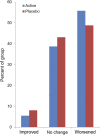Vitamin E in aging persons with Down syndrome: A randomized, placebo-controlled clinical trial
- PMID: 27164691
- PMCID: PMC4891209
- DOI: 10.1212/WNL.0000000000002714
Vitamin E in aging persons with Down syndrome: A randomized, placebo-controlled clinical trial
Abstract
Objective: To determine whether vitamin E would slow the progression of cognitive deterioration and dementia in aging persons with Down syndrome (DS).
Methods: A randomized, double-blind controlled clinical trial was conducted at 21 clinical sites, and researchers trained in research procedures recruited adults with DS older than 50 years to participate. Participants were randomly assigned to receive 1,000 IU of vitamin E orally twice daily for 3 years or identical placebo. The primary outcome was change on the Brief Praxis Test (BPT). Secondary outcomes included incident dementia and measures of clinical global change, cognition, function, and behavior.
Results: A total of 337 individuals were randomized, 168 to vitamin E and 169 to placebo. Both groups demonstrated deterioration on the BPT with no difference between drug and placebo. At baseline, 26% were diagnosed with dementia and there was an overall rate of incident dementia of 11%/year with no difference between groups. There was no effect on the secondary outcome measures. Though numerically higher in the treatment group, there was no difference in the number of adverse events (p = 0.079) and deaths (p = 0.086) between groups.
Conclusions: Vitamin E did not slow the progression of cognitive deterioration in older individuals with DS.
Classification of evidence: This study provides Class II evidence that vitamin E does not significantly slow the progression of cognitive deterioration in aging persons with DS.
© 2016 American Academy of Neurology.
Figures



Similar articles
-
Vitamin E and donepezil for the treatment of mild cognitive impairment.N Engl J Med. 2005 Jun 9;352(23):2379-88. doi: 10.1056/NEJMoa050151. Epub 2005 Apr 13. N Engl J Med. 2005. PMID: 15829527 Clinical Trial.
-
Donepezil significantly improves abilities in daily lives of female Down syndrome patients with severe cognitive impairment: a 24-week randomized, double-blind, placebo-controlled trial.Int J Psychiatry Med. 2011;41(1):71-89. doi: 10.2190/PM.41.1.g. Int J Psychiatry Med. 2011. PMID: 21495523 Clinical Trial.
-
A Randomized, Double-Blind, Placebo-Controlled, Phase II Study of Oral ELND005 (scyllo-Inositol) in Young Adults with Down Syndrome without Dementia.J Alzheimers Dis. 2017;58(2):401-411. doi: 10.3233/JAD-160965. J Alzheimers Dis. 2017. PMID: 28453471 Free PMC article. Clinical Trial.
-
Challenges in measuring the effects of pharmacological interventions on cognitive and adaptive functioning in individuals with Down syndrome: A systematic review.Am J Med Genet A. 2017 Nov;173(11):3058-3066. doi: 10.1002/ajmg.a.38416. Epub 2017 Aug 31. Am J Med Genet A. 2017. PMID: 28857390 Review.
-
Pharmacological interventions to improve cognition and adaptive functioning in Down syndrome: Strides to date.Am J Med Genet A. 2017 Nov;173(11):3029-3041. doi: 10.1002/ajmg.a.38465. Epub 2017 Sep 8. Am J Med Genet A. 2017. PMID: 28884975 Review.
Cited by
-
Outreach and Engagement Efforts in Research on Down Syndrome: An NIH INCLUDE Working Group Consensus Statement.Int Rev Res Dev Disabil. 2022;63:247-267. doi: 10.1016/bs.irrdd.2022.09.006. Epub 2022 Oct 22. Int Rev Res Dev Disabil. 2022. PMID: 36545326 Free PMC article.
-
Essential Dietary Bioactive Lipids in Neuroinflammatory Diseases.Antioxid Redox Signal. 2018 Jul 1;29(1):37-60. doi: 10.1089/ars.2016.6958. Epub 2017 Jul 24. Antioxid Redox Signal. 2018. PMID: 28637354 Free PMC article. Review.
-
Aging with Down Syndrome-Where Are We Now and Where Are We Going?J Clin Med. 2021 Oct 13;10(20):4687. doi: 10.3390/jcm10204687. J Clin Med. 2021. PMID: 34682809 Free PMC article. Review.
-
Exosomal biomarkers in Down syndrome and Alzheimer's disease.Free Radic Biol Med. 2018 Jan;114:110-121. doi: 10.1016/j.freeradbiomed.2017.08.028. Epub 2017 Sep 5. Free Radic Biol Med. 2018. PMID: 28882786 Free PMC article. Review.
-
Pharmacological Approaches to the Treatment of Dementia in Down Syndrome: A Systematic Review of Randomized Clinical Studies.Molecules. 2022 May 19;27(10):3244. doi: 10.3390/molecules27103244. Molecules. 2022. PMID: 35630721 Free PMC article. Review.
References
-
- Malamud N. Neuropathology of organic brain: syndromes associated with aging. In: Gaitz CM, editor. Aging and the Brain. 3rd ed New York: Plenum; 1972:63–87.
-
- Mann DM, Yates PO, Marcyniuk B. Alzheimer's presenile dementia, senile dementia of Alzheimer type and Down's syndrome in middle age form an age related continuum of pathological changes. Neuropathol Appl Neurobiol 1984;10:185–207. - PubMed
-
- Wisniewski KE, Wisniewski HM, Wen GY. Occurrence of neuropathological changes and dementia of Alzheimer's disease in Down's syndrome. Ann Neurol 1985;17:278–282. - PubMed
-
- Lai F, Williams RS. A prospective study of Alzheimer disease in Down syndrome. Arch Neurol 1989;46:849–853. - PubMed
-
- Janicki MP, Dalton AJ. Prevalence of dementia and impact on intellectual disability services. Ment Retard 2000;38:276–288. - PubMed
Publication types
MeSH terms
Substances
LinkOut - more resources
Full Text Sources
Other Literature Sources
Medical
Research Materials
